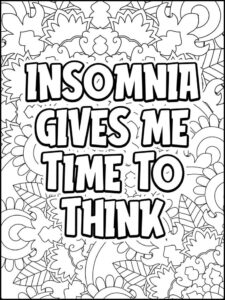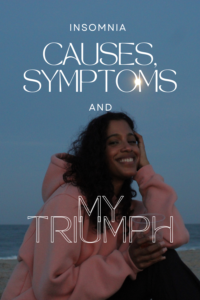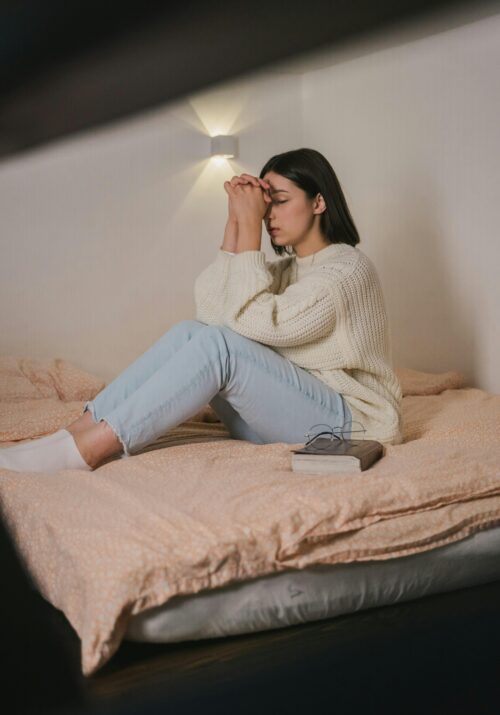
Understanding Insomnia: Symptoms, Causes, and Treatment Options
Prevalent amongst older adults, insomnia is one of the common sleep disorders that affects millions of people worldwide. In fact, 1 out of 8 adults experience it in their lifetime. Insomnia and chronic insomnia are differentiated by the amount of lack of hours of sleep and how long the lack of sleep has been endured for. Characterized by difficulty falling asleep, staying asleep, overall sleep problems, or waking up too early, insomnia can significantly impact daily life. Understanding its symptoms, causes, and treatment options is crucial for managing this condition effectively.
Symptoms of Insomnia
Here’s a list of the primary symptoms of insomnia:
- Difficulty falling asleep at night
- Jet lag without having done any extensive travel
- Waking up frequently during the night
- Waking up too early and not being able to go back to sleep
- Daytime fatigue or sleepiness
- Irritability, depression, or anxiety
- Increased symptoms to any preexisting anxiety disorder
- Difficulty paying attention, focusing on tasks, or remembering
- Increased errors or accidents
- High blood pressure
These symptoms can lead to a range of negative consequences, including reduced productivity, impaired cognitive function, and increased risk of accidents.
Causes of Insomnia
Insomnia can be caused by various factors, which can be broadly categorized into psychological, lifestyle, and medical causes:
- Psychological Factors: Stress, anxiety, and depression are common psychological triggers for insomnia. Worrying about work, school, health, or family can keep the mind active at night, making it difficult to fall asleep.
- Lifestyle Factors: Poor sleep habits, such as irregular sleep schedules, naps during the day, and using electronic devices before bed, can contribute to insomnia. Caffeine, nicotine, and alcohol consumption, especially close to bedtime, can also disrupt sleep.
- Medical Conditions: Chronic pain, respiratory problems, and gastrointestinal issues can interfere with sleep. Conditions like sleep apnea and restless legs syndrome are also common culprits. Certain medications can also disrupt sleep patterns.
Remember that the best way to ensure if you have any of these symptoms for sure that would indicate any signs of insomnia would be visiting your primary doctor to conduct a physical exam and possibly even a sleep study to thoroughly assess any underlying cause that may not be as apparent, mental health conditions, any chances for heart disease, and observing if you are operating on a natural circadian rythm.
Treatment Options
Treating insomnia involves a combination of lifestyle changes, behavioral therapies, and medical interventions:
- Lifestyle Changes: Adopting good sleep hygiene practices can significantly improve sleep quality. This includes maintaining a consistent sleep schedule, creating a comfortable sleep environment, limiting screen time before bed, and avoiding caffeine and alcohol in the evening. Utilizing a sleep diary to ensure that enough sleep is captured at a gradual pace can be quite affective.
- Cognitive Behavioral Therapy for Insomnia (CBT-I): CBT-I is considered the first-line treatment for chronic insomnia. This therapy helps individuals identify and change negative thoughts and behaviors that contribute to insomnia. Techniques include stimulus control, sleep restriction, and relaxation training. Some of these may even induce positive behavior such as a much more regulated heart rate, better quality of life, and increase in a good night’s sleep.
- Medications: In some cases, doctors may prescribe medications to help with sleep. These can include over-the-counter sleep aids, prescription sleeping pills, or medications to treat underlying conditions causing insomnia. It’s important to use these under medical supervision due to potential side effects and dependency risks.
- Alternative Therapies: Some people find relief through alternative treatments such as acupuncture, herbal supplements, and yoga. While these methods may not work for everyone, they can be effective components of a comprehensive treatment plan.
My Start of the Journey
For all 25 years of my life, I’ve never had any health issues. I was always optimal. We’re talking not even acne. Although a little bit of eczema here and there, but that’s besides the point. So this year, when I started facing serious and unusual patterns with my energy levels, falling asleep int he middle of the day with no explanation, I started to ask myself “what the hell is going on with me?”
After two weeks of this strange phenomenon, I then also started experiencing severe insomnia. Instead of randomly falling asleep at absurd times of the day due to weird and extreme fatigue, I was now also sporadically waking up in the middle of the night every 2 hours, or not even sleeping at all. When I finally reached 2-3 days of no sleep (it was all a blur), I had to realize going to the doctor was a must. Mind you, that was really hard for me – I really hate going to the doctor. Yes, I’m one of those people, don’t judge me.
The Diagnosis
After blood tests, CT scans, sleep studies, and a heart evaluation – everything came up clean except a steep Vitamin B deficiency, which I developed from not having a balanced diet from being on the go, go, go for way too long. And of course, the final verdict from my doctor when he said, “you need to take some time off to grieve.” We agreed to go the natural route instead of taking medication, which I did not want to do.
About 3 months prior I lost one of the loves of my life, my baby cousin Wilmer, to Leukemia at the age of 14. We were really close and the death was sudden, and it came at such a tumultuous time in my life where I was dealing with roommate drama, layoff anxiety (my company had a massive layoff a month prior) and dating troubles, let alone having to move to a new apartment all by myself. All this hit me all at once, and the two bereavement weeks I took off from work didn’t really seem to help.
From working like crazy post layoffs, to facing all of these personal problems all at once, I learned with the help of both my doctor and my therapist that I was in fact under an enormous amount of stress and anxiety, which ultimately led to my nervous system being ultra-activated to the point where it didn’t feel safe shutting off -especially at night where I would often grieve, because it was the only part of the day where I had time to. Essentially this was burnout, to the upmost severity.
Life After Insomnia
Going through something like that really made me realize how intertwined mental and physical wellness really are and it caused me to take a good look inward and reflect on where my energy and attention was really going, while trying to maintain a compassionate view towards myself. Criticizing how hard I was pushing myself amidst such personal and professional adversity was only going to make things worse, and this was THE opportunity to better my relationship with myself and make improvements in the wellness area of my life.
Getting educated, completing a cognitive behavioral therapy sleep program, balancing my diet, and of course, resting, were all the things I had to do during my month-long medical leave. Although my insomnia isn’t completely gone, I can say that I won that battle and I now sleep a full, uninterrupted 7-8 hours 4-5 days out of the week now, much better than before.
Life After Recovery
Now that I’m recovered, I realized that sharing personal journeys are really helpful, as it really helped me when I was looking for information online. Actually, such a scary and transformative time in my life also led to the beginning of this blog. Learning through writing and resharing is my style, and what better way to hold myself accountable then to publish it on the internet? 🙂
I hope any other fellow insomniacs out there who stumble upon this blog post know that, if the circumstances allow, you definitely can cure insomnia naturally without medication and treatment is definitely possible for you. Many people will try to get you to go the easy route, but if I can do it, I know many other insomniacs can.
I actually thank insomnia for getting me back to writing again and reminding me how fragile health and life can really be. Insomnia brought me back to the present moment and made me acknowledge what’s really important.
📌 PIN THIS POST FOR LATER





Leave a Reply